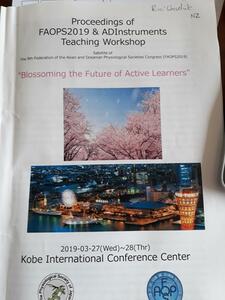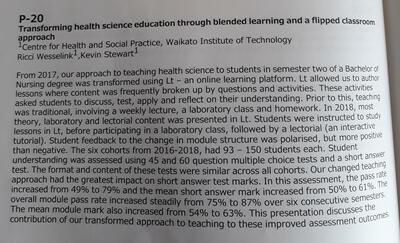Citation: UNSPECIFIED.
![[thumbnail of FAOPS 2019 Proceding cover page]](http://researcharchive.wintec.ac.nz/7327/1.hassmallThumbnailVersion/FAOPS%20procedings%20cover%20page.jpg)

FAOPS procedings cover page.jpg - Cover Image
Download (972kB) | Preview
![[thumbnail of Abstract for FAOPS 2019 poster]](http://researcharchive.wintec.ac.nz/7327/2.hassmallThumbnailVersion/FAOPS%20Poster%20abstract.jpg)

FAOPS Poster abstract.jpg - Published Version
Download (635kB) | Preview
Abstract
Abstract for poster presentation at FAOPS 2019 and ADInstruments Teaching Workshop.
Author: Ricci Wesselink, Senior Academic Staff Member, Waikato Institute of Technology (Wintec), Hamilton New Zealand.
Transforming health science education through blended learning and a flipped-classroom approach
From 2017, our approach to teaching health science to students in semester two of a Bachelor of Nursing degree was transformed using Lt – an online learning platform. Lt allowed us to author lessons where content was frequently broken up by questions and activities. These activities asked students to discuss, test, apply and reflect on their understanding. Prior to this, teaching was traditional, involving a weekly lecture, a laboratory class, and homework. In 2018, most theory, laboratory, and lectorial content was presented in Lt. Students were instructed to study lessons in Lt, before participating in a laboratory class, followed by a lectorial (an interactive tutorial). Student feedback to the change in module structure was polarised but more positive than negative. The six cohorts from 2016-2018, had 100 – 150 students each. Student understanding was assessed using 45 and 60 question multiple-choice tests and a short answer test. The format and content of these tests were similar across all cohorts. Our changed teaching approach had the greatest impact on short answer test marks. In this assessment, the pass rate increased from 49% to 79% and the mean short answer mark increased from 50% to 61%. The overall module pass rate increased steadily from 75% to 86% over six consecutive semesters. The mean module mark also increased from 54% to 63%. This presentation discusses the contribution of our transformed approach to teaching to these improved assessment outcomes.
| Item Type: | Poster presented at a conference, workshop or other event, and published in the proceedings |
|---|---|
| Uncontrolled Keywords: | Blended learning, Flipped classroom, Health, Science, Nursing, Education |
| Subjects: | L Education > L Education (General) L Education > LB Theory and practice of education > LB1028 Education Research Q Science > QM Human anatomy Q Science > QP Physiology R Medicine > RT Nursing |
| Divisions: | Schools > Centre for Health & Social Practice |
| Depositing User: | Ricci Wesselink |
| Date Deposited: | 04 May 2020 02:46 |
| Last Modified: | 21 Jul 2023 08:49 |
| URI: | http://researcharchive.wintec.ac.nz/id/eprint/7327 |

